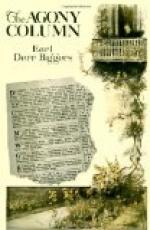I must admit that, as the colonel calmly offered this information, I suddenly went limp all over at a realization of the endless maze of mystery in which we were involved. The woman gave a little cry and Lieutenant Fraser-Freer leaped to his feet.
“How the devil do you know that?” he cried.
“I know it,” said Colonel Hughes, “because one of my men happened to be having tea at a table near by. He happened to be having tea there for the reason that ever since the arrival of this lady in London, at the request of—er—friends in India, I have been keeping track of her every move; just as I kept watch over your late brother, the captain.”
Without a word Lieutenant Fraser-Freer dropped into a chair and buried his face in his hands.
“I’m sorry, my son,” said Hughes. “Really, I am. You made a heroic effort to keep the facts from coming out—a man’s-size effort it was. But the War Office knew long before you did that your brother had succumbed to this woman’s lure—that he was serving her and Berlin, and not his own country, England.”
Fraser-Freer raised his head. When he spoke there was in his voice an emotion vastly more sincere than that which had moved him when he made his absurd confession.
“The game’s up,” he said. “I have done all I could. This will kill my father, I am afraid. Ours has been an honorable name, Colonel; you know that—a long line of military men whose loyalty to their country has never before been in question. I thought my confession would and the whole nasty business, that the investigations would stop, and that I might be able to keep forever unknown this horrible thing about him—about my brother.”
Colonel Hughes laid his hand on the boy’s shoulder, and the latter went on: “They reached me—those frightful insinuations about Stephen—in a round about way; and when he came home from India I resolved to watch him. I saw him go often to the house of this woman. I satisfied myself that she was the same one involved in the stories coming from Rangoon; then, under another name, I managed to meet her. I hinted to her that I myself was none too loyal; not completely, but to a limited extent, I won her confidence. Gradually I became convinced that my brother was indeed disloyal to his country, to his name, to us all. It was at that tea time you have mentioned when I finally made up my mind. I had already bought a revolver; and, with it in my pocket, I went to the Savoy for dinner.”
He rose and paced the floor.
“I left the Savoy early and went to Stephen’s rooms. I was resolved to have it out with him, to put the matter to him bluntly; and if he had no explanation to give me I intended to kill him then and there. So, you see, I was guilty in intention if not in reality. I entered his study. It was filled with strangers. On his sofa I saw my brother Stephen lying—stabbed above the heart—dead!” There was a moment’s silence. “That is all,” said Lieutenant Fraser-Freer.




